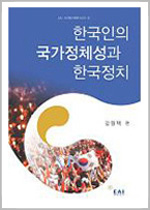
Korean Politics and National Identity
Korean Identity | Books | 2007-01-15
Won-Taek Kang, ed.
The East Asia Institute’s Center for Public Opinion Research published a book titled “Korean Politics and National Identity” based on the research on public opinion concerning national identity conducted in 2005. The book was edited by the chairperson of the EAI Citizens Politics Research Team(Won-Taek Kang, and a total of nine scholars participated to convey a message about Koreans’ strengthened national identity).
We have believed in the myth of a ‘homogenous race’ for a long time. We have learned that we are all offspring of Dangun, the legendary founding father of Korea, and lived homogeneous lives based on identical history, language, and culture. However, this myth is being challenged, since Korean society is no longer racially homogeneous. As the number of foreign laborers residing in Korea for a long period of time and the number of Koreans who marry foreigners increases, the number of multiracial Koreans is accordingly rising. Also, the Chosun race, whose appearance and language are not so different from Koreans’, regard themselves as Chinese and have Chinese nationality. In contrast, Hines Ward, who looks different from Koreans and speaks different language, is regarded as a Korean. In addition, the number of “New Koreans” who escaped from North Korea is increasing. In other words, Koreans are having an identity crisis.”
This book is an attempt to examine the change in Korean identity. It attempts to analyze how Korean identity, which was considered natural in the past, has changed over the years. This book consists of two parts: part one tracks changes in identities in Korean society, and part two examines the characteristics of new identities through the lens of changed perspectives on North Korea, reunification, and Korea’s past.
 Table of Contents
Table of Contents
Part One: National Identity and Korean Nationalism
1. Korean National (kookga) Identity and Ethnic (min-jok) Identity: Korean National Identity | Won-Taek Kang
2. Group Identity, The Social and Political Crevices | Min-jun Kim
3. Class Identity and Korean Political Behavior | Han-Wool Jung
4. Growth of Democratic Citizenship and National Identity | Han-Wool Jung, Won-Chil Jung
Part Two: National Identity and Integration
5. Koreans’ Perception of the Korean War and Independence Period, Min-jok and Kook-ga Identity | Jang-Su Kim
6. Koreans’ Assessments of Former Governments and Historical Pride | Hyun-Woo Lee
7. Koreans’ Perception of North Korea and Reunification, National Identity | Nae-Young Lee
8. Korean Anti-materialism | Jae-Yul Lee, Jun Han
*This preface was translated from the original Korean by EAI intern Chaeree Lee and edited by Ben Engel.
Center for Public Opinion Research
Korean Identity
Books
Changing Korean Voters 6: The 19th South Korea’s Presidential Election through Candle Light Protest and Impeachment
Won-Taek Kang | 2007-01-15
Books
U.S.-China Competition in the Architecture of a Regional Order in the Asia-Pacific
Young-Sun Ha | 2007-01-15